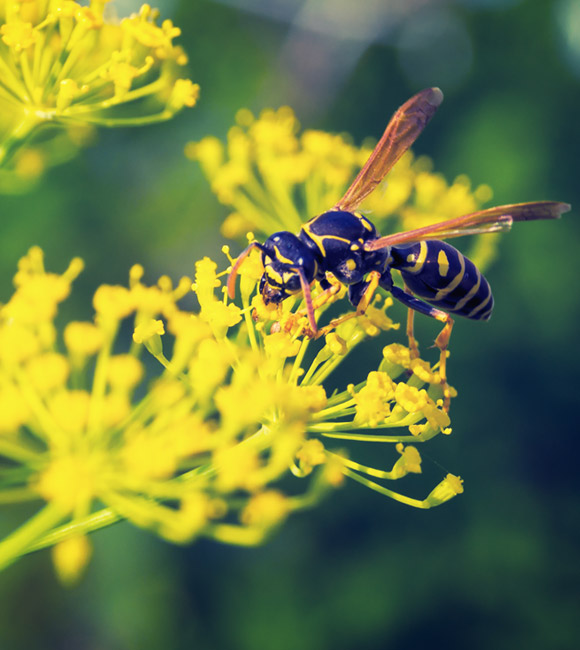Bee, Wasp, & Hornet Removal
Enjoy Your Summer Thanks to Bee, Wasp, & Hornet Removal
While we deal with a wide range of pests common to the Midwest, bees, yellow jackets, wasps, and hornets are a few pests that we often treat at Illinois Wildlife Services, Inc. Each of these insects has different behaviors and habits that we, as pest control professionals, have to understand before we can treat effectively for them. While some cause more damage or pose more of a safety hazard to your family, all are considered pests. Rely on our bee, wasp, and hornet removal services in McHenry, Lake, and Northern Cook County, and take back your patio this summer!

Understanding Your Pest: What to Know About Wasps
There are roughly 4,000 wasp species in the United States, including yellow jackets, which can be identified by their distinct coloration (alternating bands of yellow and black on their abdomen) and their rapid, side-to-side flight patterns. Wasps usually fall into two main categories: solitary and social. We see most of our customer concerns with social wasps who function in colonies that can number up to several thousand per nest. Most of the wasp species have no role in pollinating plants. Wasps build their nests in a variety of sunlight-rich places, including underground holes, attached to walls, trees, or plants, underneath decks/floors, and on the eaves of homes. Wasps will attack and sting humans and pets, especially when threatened. Yellow jackets have been known to mark their aggressors and will pursue. While their stings are repeated and painful, they’re typically only life-threatening to those with allergies. Wasps’ nests found near the home can be very dangerous and should be removed by a professional.
Understanding Your Pest: What to Know About Bees
Bees can have all-black bodies or a black or brown body with an orange or yellow striation. Bees tend to be fatter and hairier than wasps, who are usually smooth, shiny, and narrow-waisted. Honey bee colonies tend to be much larger than wasps’ nests with worker bees maintaining the hive and producing the honey. Unlike wasps, bees don’t hibernate during the winter. Bees tend to make their hives in rock crevices and hollow trees. Honey bees are only able to sting once before they die and tend to attack only when they’ve been provoked. Wasps are much more aggressive by nature than honey bees, with a single wasp able to sting multiple times.
Understanding Your Pest: What to Know About Hornets
Hornets present a significant risk to humans and pets when a colony is near a house or public area. Hornets have stingers used to kill prey and defend the nest. Hornet stings are more painful than wasp stings because hornet venom contains a large amount of acetylcholine (approximately 5%), though the toxicity varies by species. Hornets will sting multiple times and can mobilize the entire nest to sting in defense. If a hornet is killed near the nest, it may release an attack pheromone that bonds to materials that come into contact with it. Hornets are dangerous and should be dealt with only by professionals.
Safe Bee, Wasp, & Hornet Removal in the McHenry County Area
Understanding what type of insect pest you have on your residential or commercial property is essential in determining the appropriate method of removal and treatment. Illinois Wildlife Services, Inc. provides safe bee, wasp, and hornet removal services for homes and businesses in McHenry, Lake, and Northern Cook County. If you’re unsure which type of insect nest you have on your property, please feel free to call us for more info. A member of our highly trained staff would be happy to help identify your pests!
